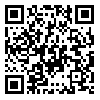Volume 18, Issue 3 (High Risk Behavior Conference Supplement 2010)
JSSU 2010, 18(3): 220-224 |
Back to browse issues page
Abstract: (20597 Views)
Introduction: Family is the initial nurture environment of a child that affects future behavior. The types of rewards and punishments in the initial stages of life affect future behavior. The aim of this study was to study the relationship between parent child– rearing practices and high risk behavior on basis of Cloninger's scale in Bandarabbas city.
Methods: The study was a descriptive correlation study. In this study permissiveness, democratic and authority parent child– rearing practices were measured with Bamerind parent child– rearing practices inventory and Cloninger's high risk behavior scale. The population under study included adolescents aged 11-18 years and their parents. A total of 150 subjects were selected randomly.
Results: The results of analysis showed that there was a significant correlation between parent child– rearing practices and subscale avoid of pathology in high risk behavior ( P value =0.035). The relation between parent child– rearing practices and authority- logical and subscale innovation in high risk behavior was also significant (P=0.022). The relation between subscale authority- logical parent child– rearing practices and subscale social reward in high risk behavior with P value of 0.037 was significant.
Conclusion: There is a significant relationship between parent child– rearing practices and helpful, harmful or destructive behavior and therefore parent's role is very important. Parent's knowledge and family trainings for rearing health are very important.
| Rights and permissions | |
 |
This work is licensed under a Creative Commons Attribution-NonCommercial 4.0 International License. |


